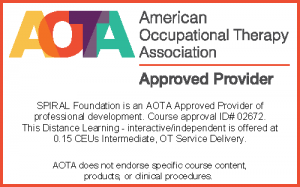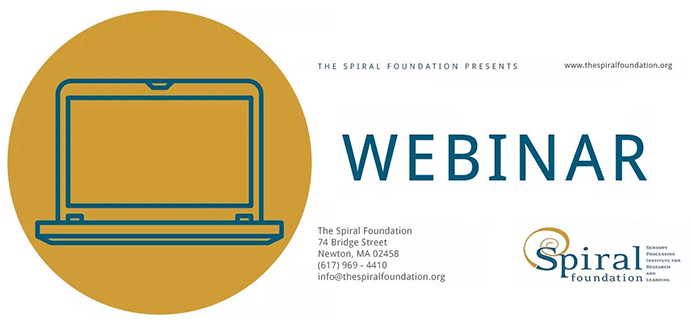Featuring: Peg Ingolia, OTD MS, OTR/L and Sarah Friel, MA CCC SLP
originally recorded August 5, 2021
Webinars are video presentations and include the recorded PowerPoint and lecture and a .pdf copy of the PowerPoint notes.
Description: Interprofessional education and practice are identified as best practice by nearly all health care professions. The World Health Organization (2010) and the Interprofessional Education Collaboration (2016) have identified interprofessional education and practice as central to improving health intervention effectiveness and client outcomes. While sensory integration intervention is not typically within the SLP scope of practice, there is a growing body of evidence that early sensory regulation is a key predictor of later language development (Norwell, 2020) and sensory modulation challenges are likely to be found in populations that SLPs routinely serve (Aitchison 2007).
A specialty sensory integration clinic engaged speech and language services alongside occupational therapy services in order to provide integrated, comprehensive support to clients and families with sensory processing and speech and language disorders, while recognizing respective professional boundaries. Within this model occupational therapists and speech and language pathologists share professional mentoring and client planning, in-service education opportunities, and physical spaces. To facilitate interprofessional practice and enhance client outcomes, speech and language pathologists needed to attain foundational knowledge and training experiences of sensory processing theory to generate a common understanding of sensory processing theory, in turn providing fidelity to sensory processing intervention principles.
This webinar builds on this clinic’s experience to describe a first step in formalizing a collaborative model of intervention – sensory processing informed speech and language intervention, Future directions will address speech and language informed occupational therapy with a sensory processing focus, and finally an integrated collaborative occupational therapy-speech and language model within the clinic.
Learning Objectives: By the end of this course participants will be able to
1. Describe three key elements of interprofessional practice in a clinical setting
2. Describe three benefits of multi-professional education and practice in clinical settings
3. Identify three ways in which patient outcomes might be enhanced in a multi-professional model
Course Level: Intermediate. There are no prerequisites for this course.
Suitable For: Occupational Therapists, OT Assistants, Speech and Language Pathologists
AOTA: Occupational Therapy Service Delivery
Contact Hours: This course is worth 1.5 contact hours or 0.15 AOTA CEUs. If you do not require a certificate of completion or AOTA CEUs you may register here.
Completion Requirements: To receive contact hours for this course you must listen to the recorded webinar in its entirety and complete the accompanying assessment.
About the Speakers:
Peg Ingolia, OTD MS, OTR/L Lecturer, Boston University; Occupational therapist, OTA The Koomar Center.
Dr. Ingolia is an occupational therapist with extensive experience in program development, evaluation, and intervention for clients and families within clinical, educational, hospital, and residential settings. She specializes in sensory processing disorders, trauma, and manual therapies in clinical practice. She has particular interest in the effects of trauma on families and her doctoral study explored the occupations of parents whose children experience complex trauma.
Sarah Friel, MA CCC SLP Instructor, Communication Sciences and Disorders Department, Massachusetts General Hospital, Institute of Health Professions (MGHIHP).
Sarah Friel is a speech language pathologist with extensive experience in early childhood disorders of communication including autism, developmental speech and language disorders, and craniofacial disorders. She is particularly interested in interprofessional practice and collaborative intervention with OTs for children with sensory processing disorders and complex needs. Sarah is also Associate Editor for Child Language Teaching and Therapy, an international, inter-disciplinary, peer reviewed journal in the field of intervention /education of children with speech, language and communication challenges.
ADA/Section 504: If you require special accommodations, please contact the Spiral Foundation at admin@thespiralfoundation.org or (617) 969-4410 ext. 231.
Continuing Education:

Occupational Therapy Practitioners/ Occupational Therapy Assistants: The Spiral Foundation is an Approved Provider of Continuing Education for occupational therapists and occupational therapy assistants by the American Occupational Therapy Association. The assignment of AOTA CEUs does not imply endorsement of specific course content, products, or clinical procedures by AOTA.

